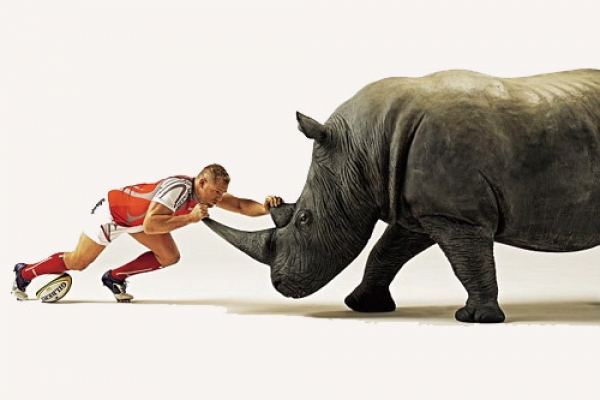The programme that I have been advising for teams and players alike is one that I prefer for a number of reasons. Rugby requires a collective effort from all the joints and muscles in our body as a whole. Imagine making a tackle: this requires a collective strength and co-ordination in your neck and shoulder as you brace yourself, your back and abs as you stabilize your upper body, your arms as you aim and grip and your hips, knees and ankles as you run and burst into the tackle. The number of muscles involved in each of these joints, their movement and stabilization before, during and after the moment of impact (including hitting the ground after the tackle) are too numerous to mention! The same can be said for every other aspect of the game. Just think of scrumming, breaking a tackle, lifting and jumping in a lineout, receiving a kick, hitting the floor and running flat out!
Hence this programme is my choice because it combines numerous compound exercises that strengthen many joints, their stabilizers, together with their main muscle movers as a unit and at the same time, with each exercise and each repetition. It also improves the proprioception control (a fancy word for the control and feedback your nervous system has over your body’s joints and muscles) and this further increases strength and decreases injuries. So a rugby player needs a simple programme that gives him strength, some size (but not that important!), stamina, control of his body and resilience to injury.
How it works: Your age and weight are taken into account. The programme calculates a factor for your specific requirements. The weight (to lift) you arrive at is the minimum that you should be doing for your age and weight i.e. it is a guideline of your personal minimum strength requirements. The exercises are broken down into 10 essential compound exercises that generally recruit many muscles per repetition and many joints and muscle groups per movement.
The standard number of repetitions is 10. This improves your ability from a purely strength as well as from a stamina perspective. This minimum number of repetitions changes for chin ups and dips and there is a minimum requirement of 15 for back hyper-extensions.
There are ten exercises and should be completed on either one or two days. The split is up to you, but a suggestion is the following split:
Day 1: Bench Press; Dips; Pull-overs; Squats; lunges.
Day 2: Chin ups; Clean and Press; Dead lifts; Military Press; Back Hyper-extensions.
Alternatively go with a simple Day 1 upper body, Day 2 lower body routine.
This strength training does not necessarily need to be at the expense of your normal gym work, just work it in before your normal training.
OBJECTIVE 1: The first objective is to be able to handle the correct number of reps (usually 10) with proper form for ONE set for the first session. If you are able to do this then move onto Objective 2. If you are unable to reach 1 set of ten reps then you need to work to complete it
OBJECTIVE 2: The second objective is to be able to handle the correct number of reps with proper form for THREE sets. This adds a fatigue and stamina element to your training. It does NOT matter that you cannot do all three sets of 10. You need to record everything and add 50% to what you are short (number of reps wise) for a forth “make up” set. E.g. Bench press might look like this: Set 1:10 reps, Set 2:9 reps, Set 3:7 reps (a total of 4 short from the last 2 sets). So you add a 4th set of 6 reps at the same weight (4 X 50% = 6). Most serious guys add another make-up set to their make-up set if they fail on that as well.
OBJECTIVE 3: To be able to increase the weight and sets beyond those prescribed.
How to arrive at your correct lifting weights:
- Step 1: Weigh yourself; this is your baseline weight.
- Step 2: For each year you are less than 21 subtract 5% from 100%. E.g. if you are 18, then subtract 15% = 85%; if you are 16, then subtract 25% = 75%.
- Step 3: Multiply your original weight by this factor. E.g. if you are 18 years and weigh 100kg then your factor is 85 (100kg X 85% = 85); if you are 16 and weigh 75Kg then your personal factor is 56 (75kg X 75% = 56).
- Step 4: Each exercise (except Chins, Dips and Back hyper-extensions), has its own factor by which you now need to multiply your personal factor. E.g. Bench press is 1.1, so if you are the 18 year old above weighing 100 kg with a personal factor (PF) of 85, you need to be benching 93kg (85 X 1.1 = 93kg). The other guy above will need to bench 62kg (56 x 1.1 = 62kg).
Here are some examples of what your programme should look like.
| Name | AGE |
WT |
PF |
BENCH |
CHINS |
DIPS |
C & P |
DL |
P/O’S |
MP |
BK EXT |
SQUATS |
LUNGES |
| REPETITIONS | 10 | 10 | 15 | 10 | 10 | 10 | 10 | 15 | 10 | 10 | |||
| EXERCISE FACTOR | 1.1 | Reps | Reps | 0.6 | 1.1 | 0.4 | 0.5 | Reps | 1.2 | 0.5 | |||
| Joe | 18 | 100 | 85 | 93 | 10 | 15 | 51 | 93 | 34 | 43 | 15 | 102 | 43 |
| Bob | 16 | 75 | 56 | 62 | 10 | 15 | 34 | 62 | 22 | 28 | 15 | 67 | 28 |
| Charl | 17 | 70 | 56 | 62 | 10 | 15 | 34 | 62 | 22 | 28 | 15 | 67 | 28 |
| Gert | 17 | 90 | 72 | 79 | 10 | 15 | 43 | 79 | 29 | 36 | 15 | 86 | 36 |
Bench = Bench Press; Chins = Chin ups; C&P = Clean & Press; DL = Deadlifts; P/O’s = Pull Overs; MP = Military Press; Bk EXT = Back Hyper Extensions
The above programme needs to be used in conjunction with a general rugby training regime including: general stamina and fitness, explosive power training i.e. polymerics; and stabilizer and proprioception training and strengthening (of ankles, knees, shoulder rotator cuffs etc.) More about these later. This SHOULD result in better performances by players and teams in general and decreased injuries, hence more success as a player and a team collectively and enjoyment.





